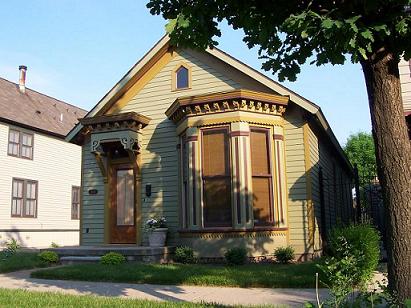
The O'Donnell House before and after renovation.
The land beneath the O'Donnell House, 1545 Leverette, shares the same history as the Joseph Kingston House until the Woodbridge Farm was platted in 1858. Leverette Street was named after the land owner's son, William Leverett Woodbridge. The oldest records spell the street without the "e" at the end, but eventually "Leverette" became standard.
On April 27, 1860, William Woodbridge sold lot 5, block 77 of his farm to Mary Laithy (Brady) Backus, daughter of Hugh Brady. After her death in February 1880, her grandson Dr. Electus Backus Ward sold the lot on October 11 of that year to Matilda Murphy. After this, unfortunately, there is a gap in the records obtained from Wayne County. Many years later the property was owned by Elizabeth O'Donnell, whose maiden name was Murphy. Matilda Murphy and Elizabeth Murphy O'Donnell were presumably related, but I have been unable to confirm this with genealogical records.
The Builder
The permit to build 1545 (originally 89) Leverette was issued to carpenter Clark Shippey on March 28, 1881. The planned dimensions were 20 by 44 feet, and the estimated cost was $900.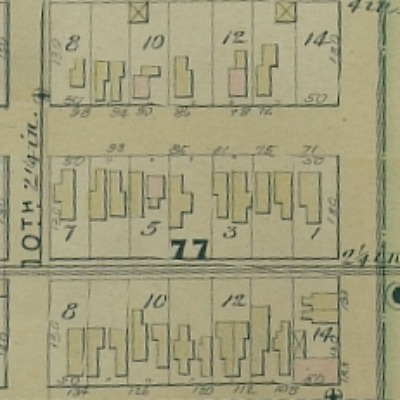
89 Leverette is on the west half of lot 5, block 77 of the Woodbridge Farm. (Source)
Clark W. Shippey was born September 28, 1836 in Windham County, Connecticut to Horace and Laura Palmer Shippey. He married Martha Maria Hough in Detroit around 1861. They had one daughter, Mary, who was born in 1867 but died at the age of 29 from diphtheria. Clark Shippey died on April 24, 1901, leaving no descendants.
The Occupants
* * * * *
John E. & Elizabeth O'Donnell
1881-1888
The first residents of 89 Leverette were John E. and Elizabeth O'Donnell. John was born to Irish immigrants Edward and Eliza Laird O'Donnell on May 14, 1853. In 1879, he married Elizabeth Murphy. They had a son, Edmund, by the time they moved to Leverette Street and had two additional children while living in the home: Stella (b. 1884) and Waldo (b. 1888). John and Elizabeth O'Donnell later had two additional children at a later residence: Edith (b. 1895) and Marie (b. 1900).
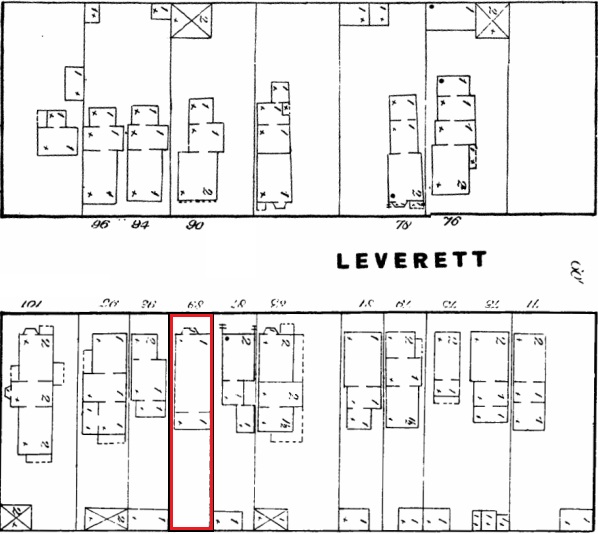
The O'Donnell House in 1887. Courtesy of Sanborn Maps.
The family lived at 89 Leverette for just seven years. During that time, O'Donnell worked as a finisher at the Hargreaves Manufacturing Company, makers of moldings and picture frames, located on Howard Street. In 1888 John O'Donnell was listed at a new address (418 [2674] Wabash) with a new occupation: police officer. O'Donnell is NOT the man in the photograph below, but the image is an example of a uniformed Detroit Police officer of that time period.

Courtesy of the Burton Historical Collection, Detroit Public Library
O'Donnell's career move would prove to be fateful. After being on the force for only twenty months, the following headline appeared on page 5 of the Detroit Free Press on October 17, 1890:

This article begins by describing William Moore--who lived in a cottage at the rear of 692 Third Street (south of Alexandrine) with his wife and three children--as a "hard drinker" and having "done no regular work for some time," although he is listed in the city directory as a butcher. The family's meager income was supplemented by their two boys, who set up bowling pins at the Detroit Athletic Club. According to this article,
Moore and his wife have frequent quarrels which often leads to blows, and every few weeks the police are called on to interfere and stop rampuses in the Moore home. Yesterday afternoon about 2:30 Moore and his wife got into an altercation about some money which Mrs. Moore refused to allow her husband to have for the purchase of liquor. Moore became enraged and finally knocked his wife down... [A]fter severely beating her, he dragged her into the dining room by the hair of her head... When the trouble first began the youngest boy, 10 years old, and his sister, 2 years old, went to the Fremont street station and informed Sergt. Sullivan...that their parents were having an awful fight, and requested that an officer be sent to the house... [T]he sergeant detailed Patrolman John E. O'Donnell to accompany the children home and see what the trouble was.The Fremont Police Station was located one block east of Woodward on Canfield Avenue, which was previously named Fremont Ave. The station was about 0.6 miles from the Moore household.
Mr. Moore reportedly threatened to kill his wife and "produced a large pocket knife, which he opened and was about to plunge into her throat when Officer O'Donnell arrived at the house." The officer forced his way into the house and attempted to arrest Moore. He resisted, and the two got into an altercation.
Moore tore himself loose from the officer's grasp and stepped back into the kitchen. He immediately reappeared with a base ball bad in his hands which he struck the officer two terrible blows on the head felling him to the ground. Drawing his revolver the policeman ordered him to desist. Seeing him again raise the bat O'Donnell fired at Moore, who fell to the ground...The rim of O'Donnell's helmet was broken by the blows from the baseball bat. He received a gash on his scalp that required stitches, and his arm, chest and shoulders were badly bruised. The bullet that hit Moore entered the left side of his chest and exited near his right armpit. He died in Harper Hospital the following day. He was fifty-five years old.
Moore was taken to Harper Hospital...while the wounded officer was taken...to his home...
Two months later, the Free Press reported that O'Donnell had been transferred from the Fremont Station to the Woodbridge Street Station, which was located in what is now Hart Plaza. There he was assigned to the position of "doorman". This was an officer who served as sort of a general manager of the station, whose duties included everything from holding the jail cell keys to custodial upkeep.

The Woodbridge Street Police Station.
Courtesy of the Burton Historical Collection, Detroit Public Library.
The attack appears to have permanently handicapped O'Donnell. Years later, this notice appeared in the Free Press:
Doorman John O'Donnell, who has been at the Woodbridge police station for many years, has been missing since last Friday. O'Donnell was assaulted by a man named William Moore several years ago. He shot Moore and the shooting has often preyed on his mind. Mrs. O'Donnell believes that he is temporarily deranged. (Detroit Free Press, May 8, 1902)O'Donnell returned home soon after. "With the exception that he remembers wandering through a woods near Woodmere cemetery and buying a loaf of bread, his mind is a blank," the paper reported the next day. "He complains of the wound he received from a prisoner years ago, and Department Surgeon Dayton Parker is attending the sick man."
That summer, O'Donnell retired from the Detroit Police. He was reported missing again the following November, but again returned unharmed. John E. O'Donnell died in Detroit on September 25, 1917, at the age of 64. Elizabeth (Murphy) O'Donnell lived to be 82, having passed away on January 10, 1943.
Short-Term Renters
1889-1906
After moving to Wabash Street around 1888, O'Donnell kept 89 Leverette as a rental home. The following individuals were listed as the heads of the household in the first years the home was rented:
- 1889 - Samuel Wesley, clerk for candy manufacturer Gray Toynton & Fox.
- 1890 - Martin Cochell, tinsmith, from Indiana. Father of fourteen children, only six of whom reached adulthood. His son John was also a tinsmith, and his daughter Lottie was a clerk for the department store Mabley & Co.
- 1891-1893 George L. Ironside, sewer assessment clerk for City Engineer's office, born in Aberdeen, Scotland. Married with three sons.
- 1894 - William J. Jones, vice-president of a knife-sharpening manufacturer with the unlikely name of Modern Novelty Co.
- 1895 - Joseph L. Bador, marine engineer. He had a wife, but she apparently resided in Ohio.
- 1896 - John Ohlert, co-owner of Ohlert Brothers Saloon at 255 (903) Michigan Ave. Born in Michigan in February, 1860. Married Esther Keveney around 1886 and had four children, only one of whom reached adulthood. His wife died in 1906, and he died from cirrhosis of the liver four years later.
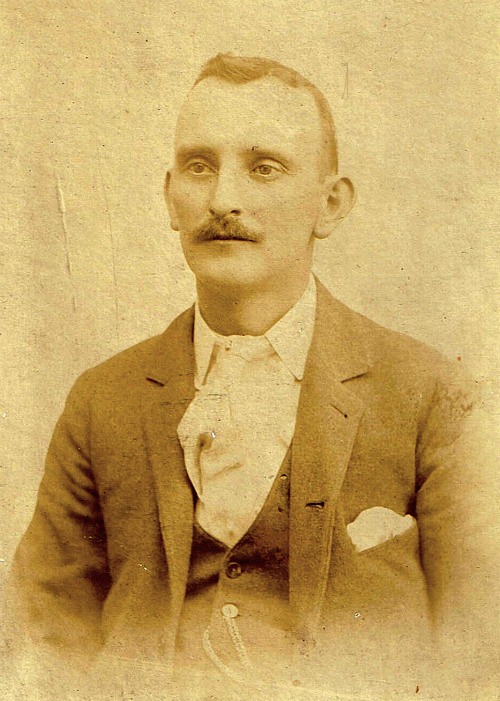
John Ohlert, circa 1900. Photo courtesy of Elizabeth
Ohlert Lawther, a great-granddaughter of John Ohlert.
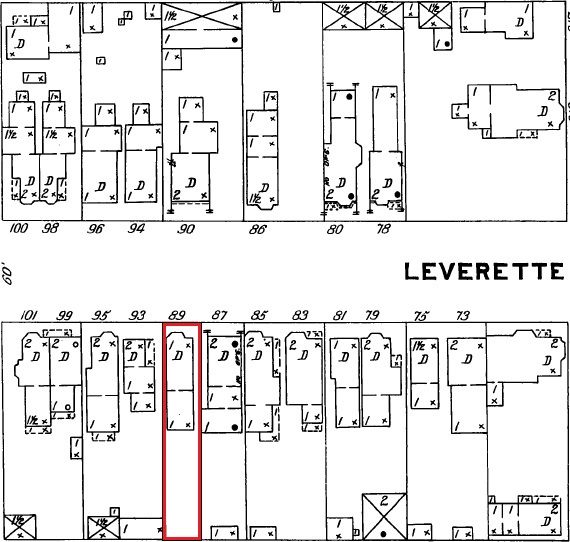
89 Leverette in 1897. Courtesy of Sanborn Maps.
- 1897 - Fred W. Heaton, chief clerk, Union Station Association. Married with one child.
- 1898-1899 - John E. O'Donnell moved back into his former home for two years. He was still working as a policeman.
- 1900 - Peter Lamont, machinist

Detail from the 1900 Census showing the occupants of 89 Leverette.
Also living with Mr. and Mrs. Lamont were William and Amand Chapin.
- 1901 - Abraham J. Brown, brakeman.
- 1902 - Martha Fox, widow of George W. Fox.
- 1903 - Alice Benjamin, widow of Jacob Benjamin.
- 1904 - Olive Paquette, widow of Julius Paquette, who died in November 1903.
- 1905 - Herman Van Wyck, painter.
- 1906 - Joseph Adair, machinist. Immigrated with his wife and five children (including a set of twins) from Canada the previous year. His son Roy was a finisher at the time, and another son William was a telegraph operator for the Postal Telegraph-Cable Company.
William & Margaret Everingham
1907-1924
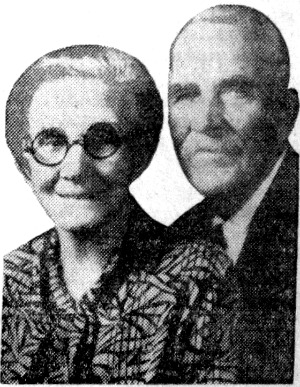
Mr. and Mrs. Everingham, years after they lived on Leverette.
William Henry Everingham was born in Dunnville, Ontario on August 24, 1844. He married Margaret Jane Long (born July 23, 1854) on June 8, 1871 in Bothwell, Ontario and they had six children together. In 1907, they immigrated to the United States with three of them (Albert Edward, Eugene Emerson, and Ella Irene). In the U.S., Mr. Everingham worked as a watchman. His sons Edward and Eugene worked as a railroad fireman and a laborer, respectively.

Detail of the 1910 census listing the residents of 89 Leverette.
The Everinghams' daughter Ella Irene married Fred Leo Wickham on September 6, 1911. Less than one year before that, Wickham's last wife, Almira Sackett, divorced him after eighteen years of marriage on account of his "drunkenness" (Detroit Free Press, 23 Oct 1910, 14). In the 1920 census, Ella was living with her husband two houses away from her parents, at 95 (1557) Leverette.
In 1914, William Everingham retired from work as a watchman and took up knitting and net-making as a hobby. Eight years later, at the age of 78, he rejoined the workforce, having taken up a job making nets for the city dog catchers.

Detail from the 1920 census showing the Everingham family at
89 Leverette and the Greenwood family at no. 87. The Green-
woods would move to 89 Leverette after the Everinghams left.
Another son of the Everinghams, William James, was living with them during the 1920 census. He was evidently separated from his wife, Alice O'Neil Everingham, at the time. She operated a boarding house on Woodward Avenue.
89 Leverette became 1545 Leverette on January 1, 1921. The image below represents the vicinity of the house that year. This block remains very well-intact today.

Image courtesy of Sanborn Maps.
The Everingham family rented 1545 Leverette until 1924. William Henry Everingham worked as a net-maker for twenty years, retiring (for the second time) at the age of 98. Margaret Jane Everingham passed away September 19, 1944 at the age of 90. William died nine months later, on June 24, 1945, having lived to be 100 years old.
Henry & Mary Greenwood
1925-1932
Henry Greenwood was born September 20, 1877 in New Bedford, Massachusetts to Sina and Celia Cutting Greenwood. Mary A. Prevost Greenwood was born in Canada around 1811 to John and Marie Simond Prevost. They were married in North Walpole, New Hampshire on October 15, 1902.
Mr. and Mrs. Greenwood lived in Detroit in 1910, but returned to New England, where they gave birth to their only child, Bruce, in 1912. They returned to Detroit by the following year. The family moved to 1543 Leverette in 1919, and moved into 1545 Leverette by 1925. They rented the home from Elizabeth O'Donnell for seven years.

Detail from the 1930 census for 1545 Leverette.
Manuel & Conception Tapia
1933-1936
No information has been found.1933-1936
Joseph A. & Willa Fontana
1937-1956?
On August 26, 1936, Joseph and Willa Fontana entered into a land contract with Elizabeth O'Donnell the purchase the double lot on which 1543 and 1545 Leverette were built. During this time they lived in 1545 Leverette. The land contract was paid in full and ownership of the property was transferred on May 6, 1942.1937-1956?
Joseph Fontana died in Detroit on July 25, 1951 at the age of 51. He was followed by his wife Willa on October 4, 1956, at the age of 66.
There is another gap in the deeds obtained from the county register. The home was later owned by the Shaffer family, but in 1956 a Mrs. Laura Fontana (listed in the directory as the widow of a William Fontana) lived at this address. It is not known if she was an heir of Joseph and Willa Fontana, whether she actually owned the house, or when exactly the home became the property of the Shaffers.
Ray J. & Mildred H. Shaffer
1957?-1982
1957?-1982
Ray J. Shaffer was an orderly at Henry Ford Hospital. He passed away November 4, 1959, when his wife Mildred became the sole owner of the property.
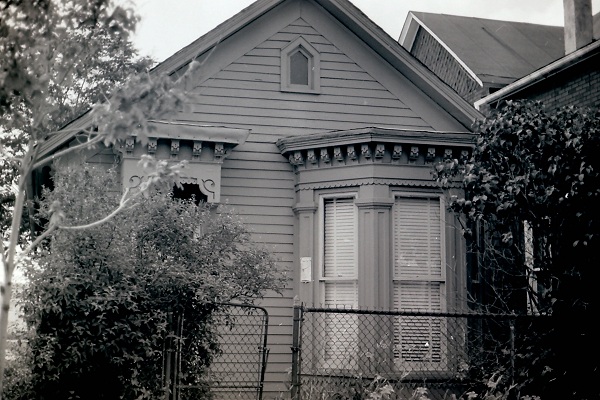
1545 Leverette in 1976. Courtesy of the Michigan State Historic Preservation Office.
By the 1970s, the other home on this double lot was demolished. This empty half of the lot and the home's back yard were used for Tiger Stadium parking by the Shaffer family.
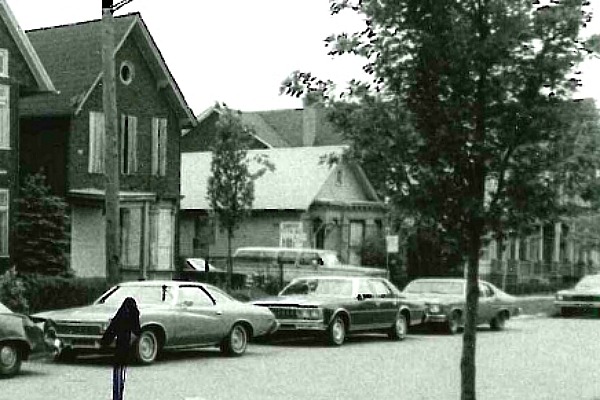
A sign advertising the available space is barely visible in this
circa-1975 photo, in addition to a vehicle parked next to the home.
Courtesy of the Michigan State Historic Preservation Office.
Jacqueline Jessie Shaffer
1982-2004
1982-2004
When Mildred Shaffer died on January 13, 1982, Wayne County Probate Court assigned the property to Jacqueline Jessie Shaffer and her brother, Eugene Elwood Shaffer. After Eugene Shaffer's death in July 1990, Jacqueline Shaffer became the sole owner.
In the early 2000s, a fire destroyed much of the rear portion of the house. Ms. Shaffer sold the dilapidated property on February 24, 2004. Until that point, the 123-year-old house had only been owned by three families.
Edward & Michelle Potas
2004
2004
The home's new owners were Ed and Michelle Potas. The photograph below was taken by Ed Potas around the time of the purchase.
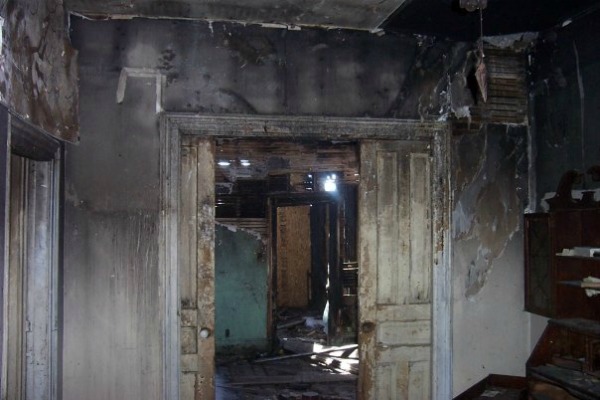
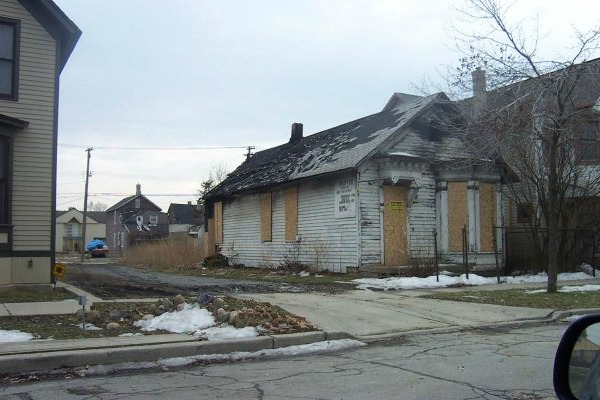
In some ways it would have made more sense to tear down a 123-year-old cottage that just barely survived a major fire--even some Corktowners advocated demolition.
The Potases, however, went out of their way to save an irreplaceable part of the neighborhood's history. Ed Potas conceived and set in motion a historic restoration of the home's exterior and a radical redesign of the interior, while Michelle managed the bureaucracy that the city imposes on projects such as this.
After the project had begun--and the roof, siding and windows had been replaced--Potas' friend and neighbor Jason Nardoni became actively involved in the renovation with the goal of purchasing the home once it became livable.
Jason Nardoni
2005-Present
2005-Present
Nardoni officially purchased the O'Donnell House on April 28, 2005. Although he has finished the interior, perfecting the home is an ongoing and consuming task.
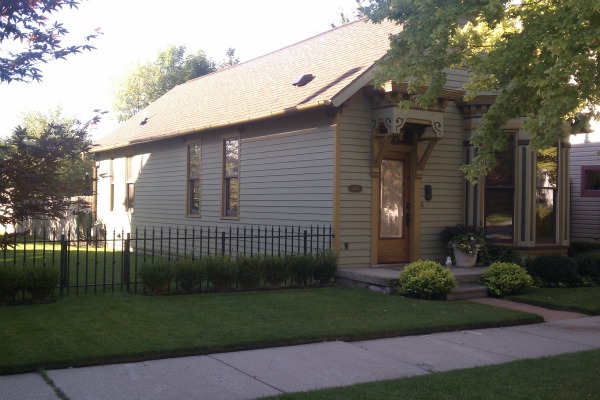
What was once a dirt parking lot is now an immaculate lawn.
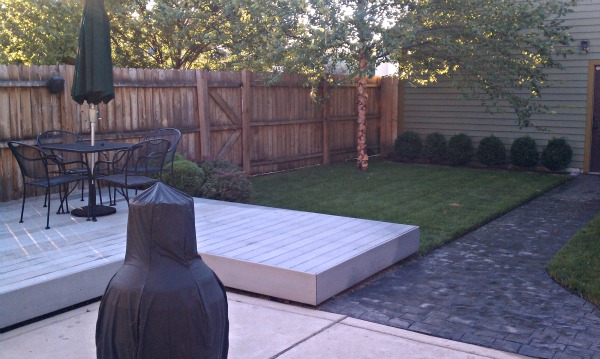
The success of this project is evidence that perhaps no home is beyond repair. Indeed, many of Corktown's endangered homes are in better condition than the O'Donnell house was at the point it was rescued from oblivion. It is my hope that that more homes like this will be saved by those with the energy, knowledge, and resources to make it happen.
